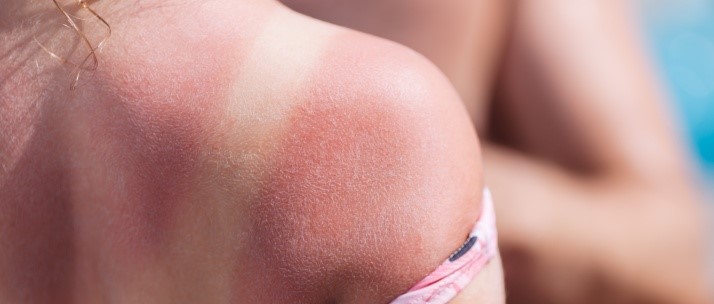
Should you wear sunscreen even when it's cloudy?
Peer reviewed by Dr Krishna Vakharia, MRCGPLast updated by Amberley DavisLast updated 23 Feb 2024
Meets Patient’s editorial guidelines
- DownloadDownload
- Share
- Language
- Discussion
We often only think about sun protection when it's sunny outside. But you still need to take steps to protect your skin even when it's overcast because the UV index can still cause lasting damage. Here's how to protect your skin on cloudy days.
In this article:
Video picks for Sun and sunburn
Should you wear sunscreen every day?
It's easy to assume that if it's not sunny outside then you don't need sunscreen - after all, you're not feeling the sun on your skin. But actually, you can still get sunburnt even when it's overcast and grey outside. It's the UV index that puts you at risk of burning, and that exists whether its bright and sunny or cloudy.
Rather than relying on what the weather looks like - or the temperature - when deciding if you need sunscreen, you should be looking at the local UV forecast, according to Dr Walayat Hussain of the British Association of Dermatologists.
"If the UV index is three or higher, you should be protecting your skin,” he explains. "Your first line of defence should always be making use of shade, particularly between 11 am and 3 pm, wearing protective clothing, and applying a sunscreen with a minimum 4-star UVA rating and an SPF of 30 or higher."
Don't fall into the trap of thinking you're safe in the shade, either. The sun's UV rays can reflect off sand, water or concrete and still cause damage to your skin. You can even get sunburnt when driving and skiing, so make sure you're always protected.
Why is UV dangerous for your skin?
Back to contentsAny time your skin is exposed to harmful UV rays you're at risk of sunburn, which not only causes aesthetic damage to your skin, like wrinkles, but also puts you at greater risk of skin cancer.
Every time your skin gets damaged by the sun it can cause mutations in your cells, which can lead to malignant tumours.
"The UV index is generally higher on cloudless, hot days; however, UV rays can still get through when it is completely overcast," Hussain says. "Although you are not more likely to get sunburnt when it's overcast, there is the risk of being lulled into a false sense of security when it is not obviously sunny.
"This can lead to sunburn on cloudy, cooler days - in spring as well as summer. In the winter months, UV protection in the UK is unlikely to be necessary except in people who are abnormally sensitive to sunlight."
UVA and UVB rays are the two main UV rays emitted by the sun. So you need to make sure you are protected from both. That means buying a sunscreen with a high enough SPF and a decent UVA star rating.
UVA rays account for up to 95% of UV radiation reaching the Earth's surface, according to the Skin Cancer Foundation. UVA penetrates the inner layer of the skin, called the dermis, and UVB mainly affects the outer layer of the skin, called the epidermis. Both can cause cancer.
Continue reading below
How can you protect yourself against sun damage?
Back to contents"UVA is associated with causing premature skin ageing, whereas UVB is most responsible for causing sunburn. Both types of UV ray can cause skin cancer," Hussain adds.
"When choosing a sunscreen, it's important to choose one with both a high UVA rating and a high SPF, to ensure you're protected from both UVA and UVB rays."
Your risk of burning also depends on how long you'll be outside for.
If you work outside, or are planning on being outdoors all day, then you'll need more protection than someone who is just going for a quick walk. But you should always opt for a sunscreen with an SPF of 30 or more, and adequate UVA protection.
It's important to remember that sunscreen goes out of date, usually every year, so if it's past its use-by date it's less effective at protecting your skin from harmful UV rays. Make sure you always check the label.
Is the SPF in a moisturiser enough?
Back to contentsSome moisturisers and makeup provide an SPF, but be careful not to fall into the trap of thinking it's enough if you're outside all day.
You need to make sure every area of your skin exposed to the sun, or not covered by clothing, is protected with sunscreen.
"SPF moisturisers and foundation can provide adequate protection if you're not planning to be outside for long periods - for example, if you're just popping to the shops at lunchtime," Hussain points out.
"However, if you intend to spend time outdoors, particularly in the summer months, sunscreens are much more effective, not least because they tend to be applied much more thickly."
Continue reading below
Skin cancer
Back to contentsSkin cancer is one of the most common cancers in the world.
In the UK, more than 150,000 new cases of non-melanoma skin cancer are diagnosed each year1. It affects more men than women and is more common in the elderly.
Around 16,500 new cases of melanoma, the deadlier type of skin cancer, are diagnosed each year2.
The most common symptoms to look out for include changes in the shape, colour, size, and edges of a mole; the formation of a new mole; and a mole on the skin that keeps bleeding.
Skin cancer can occur anywhere on the body, with most cases diagnosed in people under 50. Around 2,000 people die from melanoma each year in the UK2.
If you have any of the above symptoms you should speak with a GP as soon as possible.
Further reading
Back to contentsPatient picks for Sun and sunburn

Skin, nail and hair health
A guide to UV protection sunglasses
Sunglasses make a great summer fashion accessory, but the right pair can do so much more for you. From short-term symptoms to visual impairment and cancer, ultraviolet radiation (UV) damage from sunlight is a health concern we all need to be aware of this summer. And this starts with how we choose our sunglasses.
by Amberley Davis

Skin, nail and hair health
How to treat sunburn blisters
Hot weather seems like the best time to soak up the sun, work on a tan or play outdoors. But warmth and heat can be dangerous. Sunburn can sometimes blister, causing pain and infection. What causes sunburn blisters? How do you treat them and should you really pop them?
by Victoria Raw
Continue reading below
Article history
The information on this page is peer reviewed by qualified clinicians.
Next review due: 23 Feb 2027
23 Feb 2024 | Latest version
29 Aug 2019 | Originally published
Authored by:
Andrea Downey

Ask, share, connect.
Browse discussions, ask questions, and share experiences across hundreds of health topics.

Feeling unwell?
Assess your symptoms online for free
Sign up to the Patient newsletter
Your weekly dose of clear, trustworthy health advice - written to help you feel informed, confident and in control.
By subscribing you accept our Privacy Policy. You can unsubscribe at any time. We never sell your data.